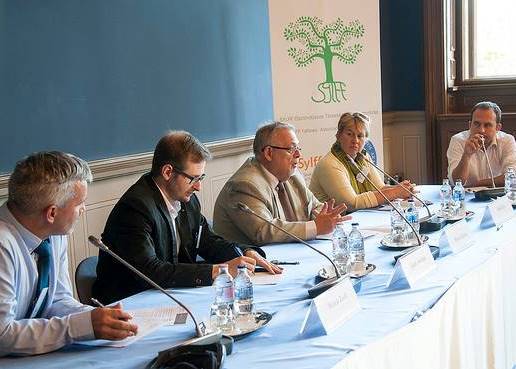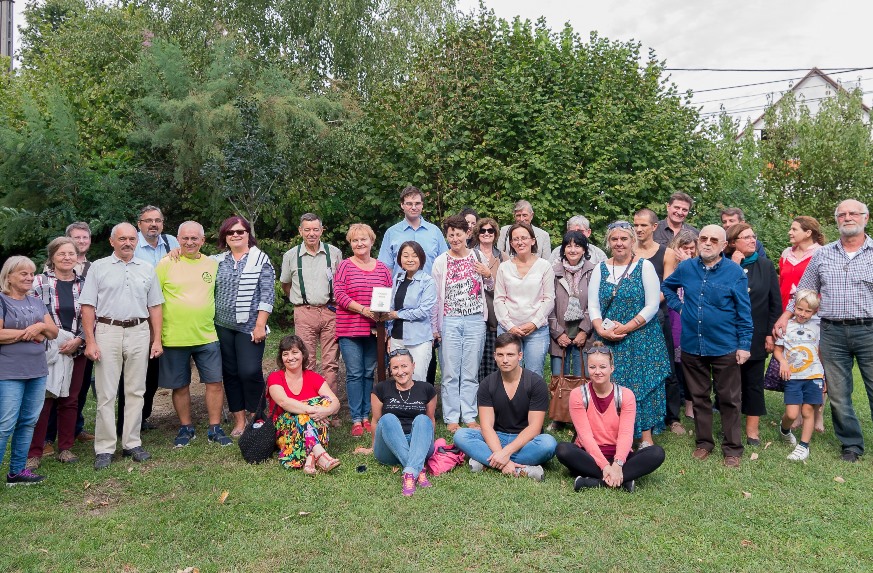Voices from the Sylff Community
Jan 5, 2018
Own Fate: Self-Managing the Future―How to Link Academic Knowledge and Local Practice
On September 8 and 9, 2017, five Sylff fellows organized an event aimed at promoting sustainable development in Hungary: Professor Eva Kiss, Dr. Andrea Kunsagi, Dr. Viktoria Ferenc, Dr. Viktor Oliver Lorincz, and Dr. Loretta Huszak. Mari Suzuki, director for leadership development of the Tokyo Foundation, attended the two-day event as a representative of the Sylff Association secretariat to support the fellows’ initiatives. The event was significant in that many participants as well as speakers consisted of past and current Sylff fellows. This opportunity served not only to encourage cooperation between academics and local practitioners in Hungary but also to strengthen the bonds among Sylff fellows in Hungary.
***
The Role of Bottom-Up Local Initiatives in Sustainable Development

A round-table discussion during the event, titled “Sustainability Initiated ‘Bottom-Up’: Is It Possible?” The participants are (from left to right): Zsolt Molnar, Andras Jakab, Balazs Hamori, Eva Deak, and Andras Takacs-Santa.
Economically and ecologically sustainable development has become a universal concern. It merits the attention and action of all of us. Hungarian fellows of the Ryoichi Sasakawa Young Leaders Fellowship Fund (Sylff) have realized that efforts are needed on a variety of fronts to promote sustainable development. Local and bottom-up initiatives have significant impact and are indispensable for sustainable development. Accordingly, more attention should be paid to them.
Post-communist civil societies, like the one in Hungary, are characterized by a lower level of participation in bottom-up initiatives by ordinary citizens.[1] Nonetheless, recent academic literature indicates that an increasing number of municipalities in Hungary possess local strategies for sustainable development or support initiatives related to sustainability.[2] These initiatives are designed to use and develop the municipalities’ own resources and internal potential to change society for the better.
The focus of the two-day Sylff event was on analyzing how imperative local bottom-up initiatives are to the economic, social, cultural, political, and legal development of modern societies and understanding how their sustainable development can be ensured and observed in Hungary. The first day was dedicated to academic analysis of the above themes, and the second day was a field trip to Szigetmonostor—one of the most active municipalities in Hungary, where the local administration is very much engaged in cooperation with grassroots initiatives. The object of the initiative was to facilitate a bottom-up dialogue between academics and local leaders and initiators. The chief patron of the event was Laszlo Lovasz, president of the Hungarian Academy of Sciences.[3]
Conference Day at the Hungarian Academy of Sciences
The first day of the initiative was an interdisciplinary forum, which took place at the Hungarian Academy of Sciences in Budapest. It was dedicated to the academic analysis of sustainability and to the scientific elaboration of the role of bottom-up local initiatives in sustainable development. After the opening addresses, Andras Takacs-Santa, program director at Eötvös Loránd University Budapest, gave an opening lecture on “The need for a protective science in the light of the ecological crisis.”[4] He pointed out that the imperative of sustainable development is forcing us to think in new ways but that the way to an ecologically sustainable future is not at all yet clear. Human ecology and the sustainable way of thinking about the Earth’s resources should “run out in all directions” and find their path to the Hungarian Academy of Sciences too.
Section 1 of the forum focused on “the spatial dimensions of sustainable development” with five presentations. The well-prepared speakers approached sustainability from different aspects - environmental, economic, and social - and on diverse spatial levels. They dealt with different parts of the world, from the regional to micro level: China, the Carpathian Basin, Visegrad countries, the South-Bekes microregion, and underdeveloped regions of Hungary. Taken as a whole, the presentations significantly contributed to the success of the conference and to a better understanding of the processes of sustainability on different spatial levels. After the presentations, there was a lively discussion in which the audience raised several questions.
Section 2 analyzed “the successes and anomalies in communication and their role in community generating, business, and social life.” These aspects were investigated from psychological, marketing, management, and human-ecological collateral perspectives. The impact of people on their environment also prevails by numerous forms of manifestation in communication. Making public property from successes and anomalies in communication may help initiate more constructive societal, business, and grassroots movements and give these movements sustainability.
“The human dimension of biodiversity” was studied in section 3. Biodiversity can be found in both nature and culture. Our world is a living network made up of the millions of species of plants and animals and thousands of human cultures and languages that have developed over time. Languages, cultures, and ecosystems are interdependent. For humanity at large, the loss of cultural and linguistic diversity represents a drastic reduction of our collective human heritage. In this section, Sylff fellows discussed human communities that have special attributes in ethnic, linguistic, and cultural respects and whose existence is endangered. The topic is highly relevant in Europe as well as in the Hungarian context. The objective of the panel was to shed light on the importance of maintaining these communities and to link the knowledge represented by Sylff fellows to the practice of local actors and decision makers in Hungary.
Topping the presentation part of the forum was the legal section, which focused on “law and equity in a sustainable society.” Beyond environmental law, the question of sustainability also emerges in other domains of legal studies and political sciences, such as constitutional law, the institutional background of the protection of future generations, populism versus long-term policymaking, and the economic aspects of environmental damages and its legal consequences.
The conference day closed with a round-table discussion. Invited participants talked about the question of “sustainability initiated ‘bottom-up’: is it possible?” It was a valuable discussion, not only in that it summarized the main findings of the conference day but also because it brought together academia and municipalities with bottom-up local initiatives, as well as nongovernmental organizations, and raised expectations for the field trip that was to follow the next day.
A key point of the conference day was that the presentations went beyond the speakers’ own research, adding aspects of sustainable economic development. They encouraged the audience to analyze the theme from broad perspectives and led to a successful forum, as audience members were able to understand the contents without specialized knowledge. The perspectives that were offered helped not only to identify research interests shared by the different disciplines but also to link academic knowledge with local practice.
Workshop Day in the Idyllic Village of Szigetmonostor

Discussion during the workshop in Szigetmonostor.
The field trip to Szigetmonostor was aimed at disseminating and applying academic knowledge to the field. To achieve these goals, academics—scientists employed by HAS (research institutions) and people employed by institutions of higher education—went to the field and experienced knowledge spillovers to the locals. Another aim was to heighten the awareness of local initiators about how academics can support and help their initiatives, thereby helping theoretical academic projects take on a more applied and realistic role; in other words, to help academic projects realize themselves in a more practical pragmatic environment.
The main reason for choosing Szigetmonostor was its isolation. Although the village is just 25 km from Budapest, it is difficult to access due to poor infrastructure; because there is no direct motorway, the only ways of reaching it are via a 50-km detour or by ferry.[5] This makes the village unique in its inhabitants’ reliance on one another. Given the natural beauty and environment of the place, which has been underdeveloped to date, it is an ideal spot to develop tourism. There is a need to create job opportunities within Szigetmonostor, as its geographic location makes it difficult for the locals to seek job opportunities in central Budapest.
Activities provided by Sylff fellows included raising awareness of the historical background of Szigetmonostor among the academic participants. Mayor Zsolt Molnar of Szigetmonostor elaborated on the current situation that the half-island was facing.[6] He gave his account at the dam, with the Danube and the city of Budapest visible in the background. This setting enhanced and inspired the visitors’ interest.
After this opening, the focus turned to local initiatives. Local initiators presented their activities and highlighted the key social challenges that they wanted to be tackled. A short group session followed, in which participants were divided into groups and had to identify possible solutions to local issues. These discussions were led by professional mediators as well as local experts. The idea was to find a common ground between the academics and locals to help with Szigetmonostor’s advancement in terms of tourism, education, local job creation, and so forth.
The group work was then followed by participants presenting new ideas and possible solutions to existing difficulties. The group activities provided a great platform for initiating future collaboration between the academics and local initiators.
Discussion during the Workshop in Szigetmonostor.

Hungarian Sylff fellows and locals in Szigetmonstor, with the newly planted Sylff tree in the background. Holding the plaque for the tree at center are Mariann Tarnoczy, who has been working with Sylff at the Hungarian Academy of Sciences since the program’s inception, and Mari Suzuki, director of leadership development at the Tokyo Foundation.
To mark Sylff’s contribution and its recognition for future collaboration, the group of workshop participants went out to a beautiful park built by the local volunteers, where they planted a South European flowering ash tree as a symbol for future collaboration. With the help of locals, the academics dug the ground and planted and watered the new tree.
Impact of the Initiative
The two-day event was well attended, which is an objective indicator of success. Eighty-one people attended the conference day, almost half of whom were Hungarian Sylff fellows. The workshop day in Szigetmonostor saw the participation of 45 academics and locals; the number of Sylff fellows was 12.
The initiative aspired to link academic knowledge and local practice. Analyzing sustainable local initiatives and their impact on society was a new activity field for most of the participants. The researchers who gave presentations had been invited to combine their actual research with this important topic. It was an experiment that made great demands of the presenters but led to unforeseen ties between researchers from different disciplines—to real-time interdisciplinary interactions.
The initiative also had the aim of contributing to society. Understanding basic human ecology principles and the operation of local initiatives can help to map out and evaluate alternatives. The participants identified such principles and recognized new opportunities for cooperation between local initiators and academics. We hope that this future cooperation will lead to positive social change in such forms as increased citizens’ participation in local initiatives, better understanding of the significance of such initiatives among scholars, and more academic projects taking on advanced applied and realistic roles.
A well-informed public is crucial for sustainable development. The media can help reach a wider audience, inform local stakeholders, and direct attention to the role of local initiatives in Hungary’s sustainable economic development. The first report of the initiative has already been published; an article appeared in the local online newspaper of Szigetmonostor, informing local stakeholders about the event..[7]
The organizers of the initiative have prepared a special edition for Magyar Tudomany, the periodical of the Hungarian Academy of Sciences. All manuscripts are completed and should be published in the coming weeks. In addition, a seven-minute video on the initiative will be published soon on social media and Internet channels (YouTube and Facebook).

The main organizers of the event (from left to right): Viktoria Ferenc, Andrea Kunsagi, Eva Kiss, Loretta Huszak, and Viktor Lorincz.
[1] Marc Marje Howard, The Weakness of Civil Society in Post-Communist Europe (Cambridge: Cambridge University Press, 2013), p. i.
[2] Henrietta Nagy, Tamas Toth, and Izabella Olah, “The Role of Local Markets in the Sustainable Economic Development of Hungarian Rural Areas,” Visegrad Journal on Bioeconomy and Sustainable Development, vol. 1, no. 1 (2012): pp. 27–31. https://vua.uniag.sk/sites/default/files/27-31.pdf
[3] For a list of elected chief officers of the Hungarian Academy of Sciences see:
http://mta.hu/english/elected-chief-officers-of-mta-106110
[4] For further information on Andras Takacs-Santa visit: http://tatk.elte.hu/en/staff/TakacsSantaAndras
[5] Official website of the municipality: http://szigetmonostor.hu/ (in Hungarian)
[6] For further information on Zsolt Molnar visit: http://szigetmonostor.hu/index.php/onkormanyzat/polgarmester (in Hungarian)
[7] Loretta Huszak, “Az MTA kutatóinak és ösztöndíjasainak látogatása Szigetmonostoron,” Ujsagolo, vol. 23, no. 10 (October 2017): pp. 1, 10. http://szigetmonostor.hu/images/dokumentumok/ujsagolo/ujsagolo_2017_10.pdf
